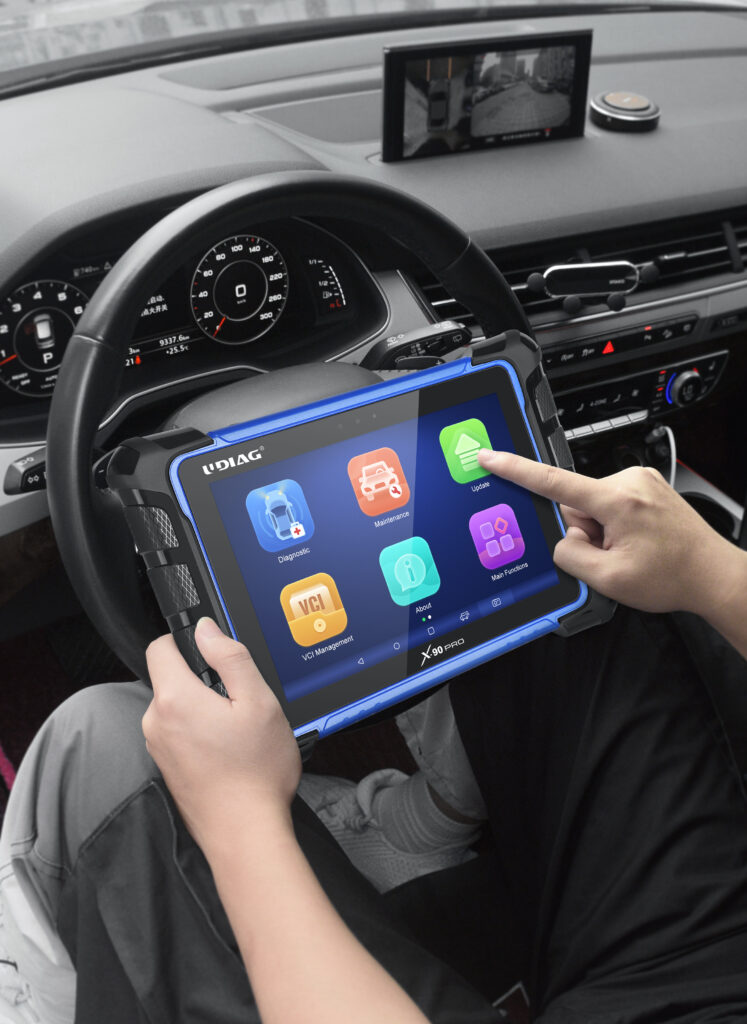Are car diagnostic tablets compatible with all car makes and models?
2024-03-30 by UDIAG
Car diagnostic tablets have become indispensable tools in modern vehicle maintenance, offering efficient and accurate diagnostics for automotive technicians and enthusiasts alike. As vehicles become increasingly complex, these tablets play a crucial role in identifying and resolving issues promptly. However, a pertinent question arises: Are car diagnostic tablets compatible with all car makes and models? In this essay, we delve into the intricacies of compatibility across different makes and models, considering various factors influencing their effectiveness.

I. Understanding Car Diagnostic Tablets
Car diagnostic tablets are sophisticated devices equipped with advanced software and hardware components designed to communicate with a vehicle’s onboard computer systems. They offer a wide range of functionalities, including reading diagnostic trouble codes (DTCs), monitoring sensor data, performing system tests, and even programming certain vehicle components. These tablets come in various forms, from handheld devices to smartphone applications, catering to different user preferences and needs.
II. Factors Influencing Compatibility
Several factors determine the compatibility of car diagnostic tablets with various makes and models. Firstly, adherence to OBD (On-Board Diagnostics) or OBD-II standards is crucial, as these protocols define the communication interface between the diagnostic tool and the vehicle’s electronic systems. Additionally, different car manufacturers may employ proprietary communication protocols, necessitating specific software and hardware support.
Moreover, regular software updates are essential to ensure compatibility with newer vehicle models and systems. Manufacturers often release updates to address bugs, add new features, and enhance compatibility with a broader range of vehicles. However, outdated diagnostic tablets may struggle to communicate effectively with newer car models, highlighting the importance of ongoing support and maintenance.
III. Compatibility Across Different Car Makes
While most car diagnostic tablets claim compatibility with multiple makes and models, the reality can be more nuanced. Major car manufacturers may adhere to standard OBD-II protocols, ensuring broader compatibility across their vehicle lineup. However, niche or luxury brands may implement proprietary protocols, requiring specialized diagnostic tools for effective communication.
Common compatibility issues include differences in data interpretation and system access limitations. Some diagnostic tablets may excel in diagnosing certain makes while struggling with others due to variances in system architecture and communication protocols. Nevertheless, advancements in diagnostic technology have led to the development of universal tools capable of handling diverse makes and models more effectively.
IV. Compatibility Across Different Car Models
Within the same car make, compatibility can vary significantly across different models and model years. Technological advancements and variations in onboard systems present challenges for diagnostic tool manufacturers in ensuring comprehensive compatibility. Newer vehicle models may incorporate sophisticated electronic systems with enhanced security measures, requiring diagnostic tools to adapt accordingly.
Moreover, the proliferation of hybrid and electric vehicles introduces additional complexities, necessitating specialized diagnostic capabilities. Factors such as battery management systems, motor controllers, and regenerative braking systems pose unique challenges for diagnostic tablets, highlighting the need for continuous innovation and development in this field.
V. Advancements and Trends
Despite the challenges, the automotive industry is witnessing significant advancements in diagnostic tablet technology. Universal diagnostic tools capable of interfacing with a wide range of makes and models are gaining popularity, offering versatility and convenience for automotive professionals. Wireless connectivity and cloud-based solutions enable real-time data sharing and remote diagnostics, revolutionizing the way vehicle maintenance is performed.
Furthermore, the integration of artificial intelligence and machine learning algorithms enhances diagnostic accuracy and efficiency. These technologies enable predictive maintenance capabilities, identifying potential issues before they escalate and optimizing vehicle performance. As diagnostic tablets evolve, they are poised to become indispensable assets in the automotive repair ecosystem.
VI. Case Studies and Examples
Several success stories illustrate the effectiveness of car diagnostic tablets across diverse makes and models. Automotive technicians have reported significant time savings and improved diagnostic accuracy when using advanced diagnostic tools equipped with comprehensive database libraries and intuitive user interfaces. Moreover, collaborative efforts between diagnostic tool manufacturers and carmakers have led to tailored solutions addressing specific compatibility challenges.
However, instances of compatibility issues persist, highlighting the ongoing need for collaboration and innovation. Customer feedback and user experiences play a crucial role in driving improvements and addressing emerging challenges in the field of vehicle diagnostics.
VII. Future Perspectives
Looking ahead, the future of car diagnostic tablets appears promising, with continued advancements expected to address existing compatibility limitations. Manufacturers are investing in research and development to enhance interoperability and streamline diagnostic processes across all makes and models. Moreover, the advent of autonomous vehicles and connected car technologies will usher in new opportunities and challenges for diagnostic tool manufacturers, necessitating agile solutions capable of adapting to evolving automotive ecosystems.
Conclusion
In conclusion, while car diagnostic tablets offer invaluable assistance in vehicle diagnostics, their compatibility across different makes and models remains a complex and evolving landscape. Factors such as communication protocols, software updates, and technological advancements influence their effectiveness in diagnosing automotive issues. However, advancements in diagnostic technology, coupled with collaborative efforts between industry stakeholders, are driving improvements and paving the way for more comprehensive and versatile diagnostic solutions in the automotive industry.
FAQs
1. Can I use the same diagnostic tablet for different car brands?
Yes, many diagnostic tablets offer compatibility with multiple car brands, but it’s crucial to verify compatibility with specific models and years.
2. How often should I update the software of my diagnostic tablet?
It’s recommended to regularly update the software of your diagnostic tablet to ensure compatibility with newer vehicle models and to access the latest features and bug fixes.
3. Are there any universal diagnostic tablets that work with all vehicles?
While some diagnostic tablets claim to offer universal compatibility, it’s essential to research thoroughly and consider the specific requirements of your vehicle fleet or diagnostic needs.
4. Can I use a diagnostic tablet for both personal and professional use?
Yes, many diagnostic tablets are suitable for both personal and professional use, offering flexibility and versatility in various automotive settings.
5. Are there any subscription fees associated with diagnostic tablet software updates?
Some diagnostic tablet manufacturers may require subscription fees for accessing regular software updates, while others may offer free updates as part of the purchase package. It’s essential to clarify this with the manufacturer.
6. What should I do if my diagnostic tablet encounters compatibility issues with a specific vehicle?
If you encounter compatibility issues with your diagnostic tablet, consider consulting the manufacturer’s support team for assistance or exploring alternative diagnostic solutions tailored to your vehicle’s requirements.


